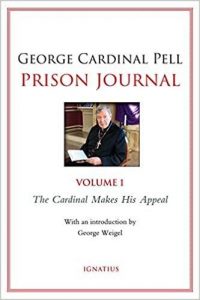The Varnished Culture's Thumbnail Reviews
Regularly added bite-sized reviews about Literature, Art, Music & Film.
Voltaire said the secret of being boring is to say everything.
We do not wish to say everything or see everything; life, though long is too short for that.
We hope you take these little syntheses in the spirit of shared enthusiasm.
A Midsummer Night’s Dream

(Opera by Benjamin Britten) (Directed by Neil Armfield) (Adelaide, 2 March 2021)
“Lord, what fools these mortals be!” That’s what the impresario said about staging The Dream, one of Shakespeare’s wisest, wittiest and most surreal plays, full of beautiful poetry, but a nightmare to stage, invariably a disaster. Britten saw that it would make for better fare as a short opera, although the singing parts are eccentric (and the overall effect, flipping the switch to matinee vaudeville, appeasingly cartoon-like – Quoth Auden: “Dreadful! Pure Kensington”). So, here, is the set, but it is entirely apt for this production, a dappled blue-green slice of aberrant Australian bush with twinkles of light and shifting silhouettes (designed by Dale Ferguson). It’s a long way from Athens, but less erotic than some Greek literature.
Everything shifts: what appears to be an immense, translucent, polycarbonate sheet, breathes and stops (redolent of sleep apnea), and dances above and upon the stage; Oberon, kinky Fairy King (counter tenor Aryeh Nussbaum Cohen, crisp and clear in his singing albeit borderline alto/castrato) hovers like a drone above the action, while earth-bound Puck (an energetic and likeable Mark Coles Smith) hurls himself about and co-ordinates the dreamers in a meddling fashion. Meanwhile, Tytania (a superb Rachelle Durkin) wrangles her cast of attendant fairies (the Young Adelaide Voices). The daydreamers, the human and deliberately interchangeable star-crossed lovers (Andrew Goodwin as Lysander, Sally-Anne Russell as Hermia, James Clayton as Demetrius, and Leanne Kenneally as Helena (particularly good), all straight from a ’50s sitcom) and the pantomiming mechanicals, offer carnal comic relief.

“The course of true love never did run smooth.”
The subtle harmony, shifts of tonal colour from ethereal to corporeal, and overall mood of Britten’s score are sweet and were well interpreted (though somewhat sedate and muted) by the Adelaide Symphony Orchestra under Paul Kildea.
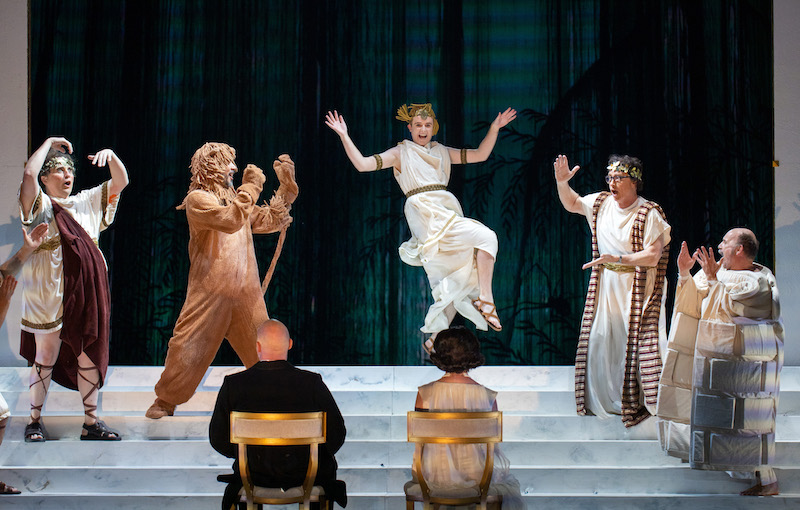
Theseus (Teddy Tahu Rhodes) and Hyppolita (Fiona Campbell) enjoy the play-within-play, featuring those masters of nuance, the Mechanicals.
The Mechanicals’ shenanigans reminds us how cruelly comedy dates. But the group work hard at being liked, and are liked, led by the most important of them Warwick Fyfe, as Bottom, a rural Falstaff, in fine voice and mugging to advantage, plus, best behaved of the lot when leashed, ‘Lock’ (the director’s dog) as Dog.
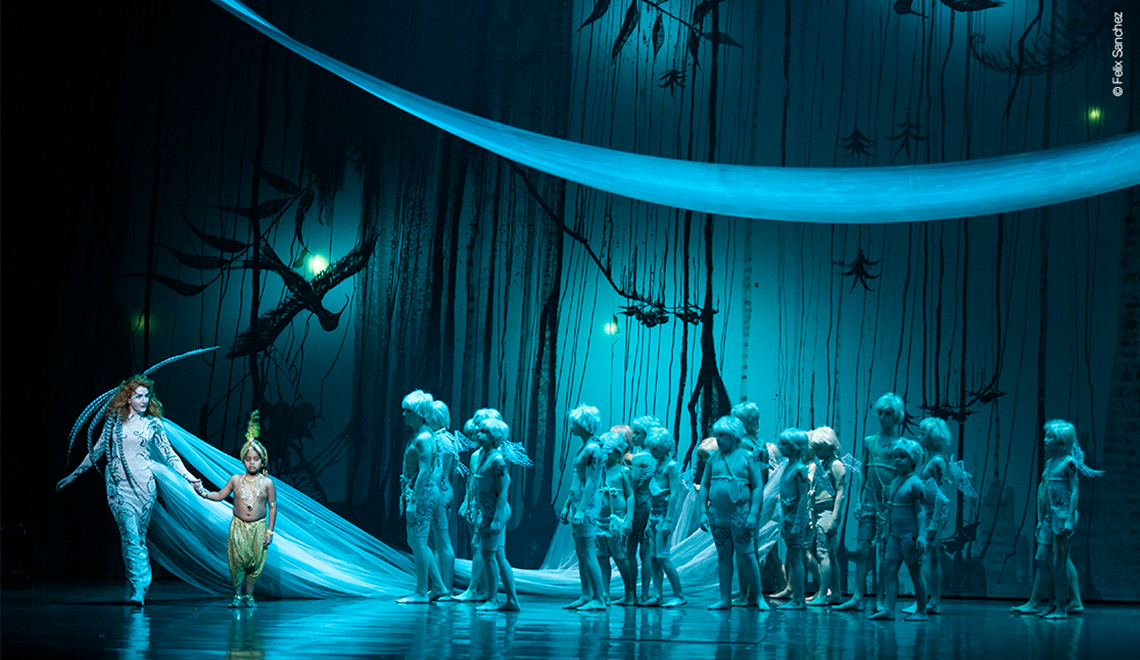
On balance, we’ll take Mendelssohn, or even Peter Grimes, thanks, but this was a production that elevated the best of the material, and you can’t do much better than that.
“If we shadows have offended,
Think but this, and all is mended,
That you have but slumbered here
While these visions did appear.”

Horsing around makes you look an ass
Beethoven – Hits

(Capri Theatre, Adelaide, 23 February 2021)
Beethoven was a real grind: loads of chamber pieces, choral works, incidental music and variations, songs, 17 sets for string quartets. At the Capri Cinema on Tuesday night TVC enjoyed 7 short pieces by a young but accomplished string quartet* (2 violins, 1 viola, 1 cello) of his works, in a theatre lit only by numerous candles (see main image). The event is part of a series of such offerings around the country, and well worth attending, as they are accessible, enjoyable, and inexpensive.

‘Beethoven’s Best Works performed by a String Quartet’ included:
- Quartet no. 4 Op 18 Mvt: 1 Allegro ma non Tanto
- Quartet no. 5 Op 18 Mvt: 3 Andante Cantabile
- Quartet no. 3 Op 18 Mvt. 4 Presto
- Quartet no. 1 Op.18 Mvt: 2 Adagio
- Quartet no. 4 Op 18 Mvt: 4 Allegro
- Quartet no. 3 Op 59 Mvt: 3: Minuette & Mvt 4: Allegro Molto
and concluded with an extract from the 9th symphony as a finale (in place of an encore)
[* The string quartet was accomplished, as we said, but we do not know their names, and are currently making inquiries.] Continue Reading →Out of the Past

(Directed by Jacques Tourneur) (1947) (Script by Daniel Mainwaring (“Geoffrey Homes”) from his 1946 novel Build My Gallows High, with uncredited revisions by Frank Fenton and James M. Cain.)
Before we review this complicated, compelling film, first allow us to modestly refer you to our discussion: what is Film Noir?
Furthermore, in the spirit of commercial DVDs, can we clear away some preliminaries? Don’t you hate it when, having purchased a film with your hard-earned, you then have to suffer some minutes of being lectured against pirating and illegal downloads? Or trying to disable the o-so-welcome options of surtitles (in English, for a film in English) or over-dubbed commentary by some twit writing his thesis at Berkeley on “Hollywood – the early years”? Or, worst of all, previews (why we never get to the cinema until 10 minutes after showtime).
So, now that is Out of the Way, let’s discuss Out of the Past. This is perhaps the ne plus ultra of classic film noir, with a fatalistic, pretzel plot, a sensational script that combines Shakespearean gravitas with Swiftian humour, great performances, and all the trappings and trimmings of the style.

We’ll attempt to sum up the plot, referring to some of the crackling dialogue, even if some of it seems to be in code, and much of the retorts, in real life, you’d only think of the next day:
Jeff Bailey (Robert Mitchum, in a brilliant turn, insouciant, nonchalant, cheeky and world-weary) runs an auto-shop in Hicksville (actually, Bridgeport), but tends to goof-off fishing with his sweetheart, Ann (Virginia Huston) When asked which place he’d most want to be, he replies right here, with her (“I bet you say that to all the places.” Meanwhile, Joe Stephanos (Paul Valentine, amiable, self-deprecating and lethal) drives into town (in an opening sequence that might have inspired scenes from Touch of Evil) and starts asking about Bailey (“Small World.” “Big Sign.”) Joe is the hired thug for shady gambler Whit Sterling (Kirk Douglas, in top form, all verve and cunning). Jeff is less than thrilled to see Joe again, especially when Joe issues an invitation (more a summons) to Jeff to come out to Lake Tahoe to see Whit.
The screen having gone a little hazy as the various characters have already smoked a dozen cigarettes, it is time for a flashback. Jeff collects Ann and as they do their trip to Tahoe, he explains (warning of his story that “Some of it’s going to hurt ya!“), that events out of the past have caught up with him, that he used to be Jeff Markham, a detective in NYC, hired by Whit to track down his girlfriend, Kathie Moffat (pouty Jane Greer, perhaps the best on-screen femme fatale, described by Jeff as “awfully cold around the heart“). Whit and Kathie had a serious lover’s spat: she shot him and left with $40,000. Whit isn’t fussed about the money, he says: “I just want her back. When you see her, you’ll understand better.” “What happens to her?” “I won’t touch her.” Jeff is dubious, and his partner annoyed at being sidelined by Whit, but $5,000 upfront and a contract to pay $5,000 plus expenses on delivery seals the deal.

Finding a friend who tells Jeff she and Kathy recently got vaccinated, and that Kathie was going to Florida for the warm weather, Jeff figures that you get vaccinated not for Florida, but Mexico, so he heads down there and sniffs around, and sits around, drinking beer. “And then I saw her, coming out of the sun, and I knew why Whit didn’t care about that 40 grand.” Kathie denies taking any money but has only one regret about shooting Whit: “I’m sorry he didn’t die.” “Give him time.” There ensues a slow stalking, in cantinas, night clubs, on the beach amongst the fishing nets: “I never saw her in the daytime. We seemed to live by night. What was left of the day went away like a pack of cigarettes you smoke.” Jeff is straying from his brief: “And every night I went to meet her. How did I know she’d ever show up? I didn’t. What stopped her from taking a boat to Chile or Guatemala? Nothing. How big a chump can you get to be? I was finding out. And then she’d come along like school was out, and everything else was just a stone which sailed at the sea.” Jeff and Kathie decide to run away and be together, lying to Whit and Joe even when they turn up in Mexico (“Let’s go down to the bar, you can cool off while we try to impress each other“) and sneaking back to the States, setting up in San Francisco. But they are rumbled by Jeff’s former partner, Jack Fisher (Steve Brodie), whom Kathie shoots dead, leaving Jeff behind with the body and a bank book showing a deposit of $40,000. Jeff turns in his gumshoes and retires hurt (“Don’t you like to gamble?” “Not against a wheel.”)
Out of the past into the present: Ann drops Jeff off at Whit’s big house on the lake. Whit is all bonhomie, and Jeff asks him if he has hard feelings: “Hard feelings? About ten years ago I hid them somewhere and haven’t been able to find them.” Whit wants Jeff to recover some compromising tax records in the possession of a crooked accountant, Leonard Eels, who is blackmailing him (“This might sound ridiculous, but you could pay ’em.” “Pay the government? That would be against my nature.” And then Kathie appears at the breakfast table on the terrace. Whit is a smiling villain, whose every pleasant remark veils menace and threat: “You remember Kathie, don’t you?” “You’re working for me now.” Jeff takes Kathie’s re-appearance somewhat badly: “You’re like a leaf that the wind blows from one gutter to another…Just get out will ya? I have to sleep in this room.”
In a complicated pantomime, Eels’ secretary, Meta Carson (Rhonda Fleming, in an effective small role – “Do you always leave fingerprints on a girl’s shoulder?“) sets up both Eels and Jeff: Eels gets a lead sandwich, but Jeff manages to swipe the papers, contaminate the crime scene, and move the body, throwing all (including the viewer) into some confusion. Kathie is up to no good as usual but slips up, as Jeff discovers she has tried to frame him both for the murder of Eels and the shooting of his former partner, Fisher.) “You ought to have killed me for what I did a moment ago.” “There’s time.” “I don’t want to die.” “Neither do I, baby, but if I have to, I’m going to die last.”
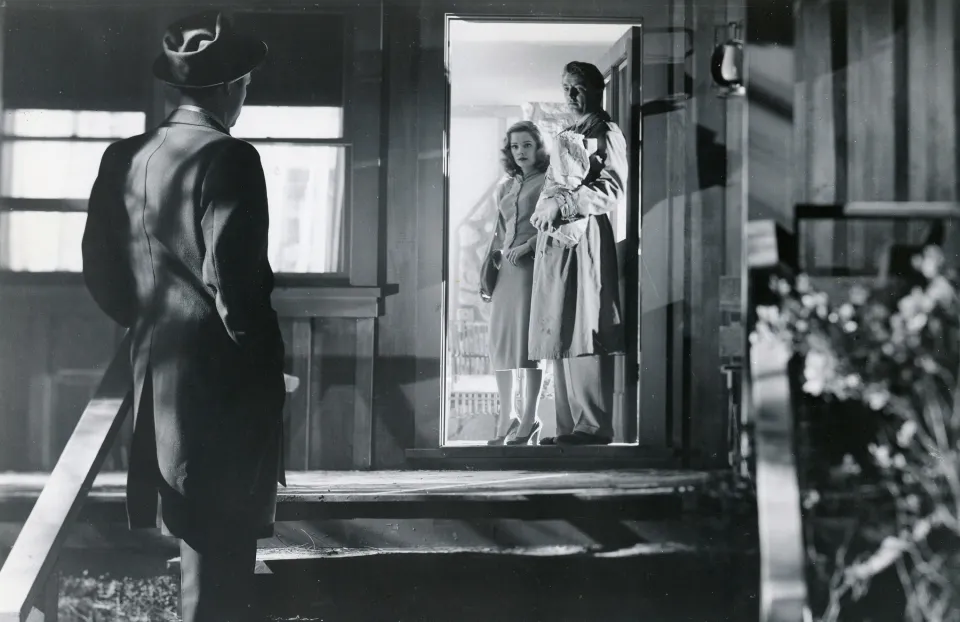
‘When the best laid schemes o’ Mice an’ Men, Gang aft agley…’
Escaping the clutches of various goons and police, Jeff returns home but Kathie sends Joe to kill him. However, Joe, having followed Jeff’s employee, the deaf mute lad (Dickie Moore) to the river, he is snagged by a neat cast from the kid’s fishing line just as he is about to fire and falls to his death. Jeff goes to confront Whit and Kathie. When Kathie plays the innocent, (“You think I sent Joe?“) he replies, dripping with sarcasm, “Oh, you’re wonderful, Kathie.” (It recalls the deep affection and trust between Sam Spade and Brigid O’Shaughnessy in The Maltese Falcon.) Jeff demands the affidavit Kathie has given Whit, alleging Jeff killed Fisher: “See I only buried him, but you don’t get the gas for just burying him.” The difficult conference continues:
Jeff: You take the frame off me. You pin the Eels murder on Joe.
Whit: Sure, sure.
Jeff: I get a modest settlement, say, oh, say $50,000. That should be enough for me to spend my waning years in Mazatlan. Not Acapulco, because I’d keep thinking about you, Kathie, up there in the women’s prison in Tehatchapie. It won’t be too bad. Hills all around you. Plenty of sun. (To Kathie) You make me nervous. You’d be happier if you let the cops have her, Whit. That’s what you’ll have to do. Somebody’s got to take the rap for Fisher’s murder. It’s not going to be me.
Whit: Wait a minute. I’m not framing any woman.
Jeff: When did you reform? I wouldn’t try it, Whit, you’re out of shape. Besides, it’s not a frame. She shot him.
Kathie: He was going to kill you.
Jeff: You see, Whit, self-defense. A cinch to beat. She might not even have to do time.
Kathie: I’ll say you killed him. They’ll believe me.
Jeff (to Whit): Do you believe her? Go on Kathie, tell him about Joe.
Jeff quits the room, Whit’s charm drops like a stone in a pond: he slaps Kathie, hard and tells her, teeth clenched: “You dirty little phony. Go on, lie some more. Tell me how you handled things for me in San Francisco. Tell me it was all Joe’s idea. Go on, Kathie, show me how you’re gonna squirm your way out this time. What a sucker you must think I am. I took you back when you came whimpering and crawling. I should have kicked your teeth in. No, I’m not going to. Not now, Kathie. We’re gonna let the law push you around…You’re gonna take the rap and play along. You’re gonna make every exact move I tell ya. If you don’t, I’ll kill ya. And I’ll promise you one thing. It won’t be quick. I’ll break you first. You won’t be able to answer a telephone or open a door without thinking: ‘This is it.’ And when it comes, it still won’t be quick. And it won’t be pretty. You can take your choice.”

“a slim, lovely little thing with eyes too big for her face and the serene look often seen on nuns.”
Jeff visits Ann, and confronts local cop Jim (Richard Webb) who claims Ann is his girl: “I’ve loved her ever since I fixed her roller skates.” Jeff begs to differ and returns to Whit’s house to clinch the deal. But Whit’s been dealt his last hand: “You can’t make deals with a dead man, Jeff…You’re no good, and neither am I. That’s why we deserve each other.” The new deal is run away with Kathie to Mexico or take the rap for Fisher, Joe and Whit. The bloody denouement seems to have been inevitable all along, as well as a happy ending for the roller skaters, heading off to their future in the wake of a domestic white lie.
Out of the Past is so dense and rich that it requires several viewings – but several viewings pays off. It is undeniably one of the great film noirs.
Continue Reading →Zappa

(Directed by Alex Winter) (2020)
Frank Zappa (21/12/1940 – 4/12/1993) was a one man show created for an audience of one: himself. Obsessively writing, arranging and producing realms of material, he’d allow others to perform with him, though they were never quite good enough, and he’d suffer people to buy his records or attend his concerts, although they weren’t really hip enough to understand the work. It was either his way or go elsewhere. And his unorthodox, multi-faceted output is always interesting, even if, for example, a double album like 200 Motels turns out to be a bizarre waste of time. He was the Alban Berg of our epoch. But records such as Freak Out!, Joe’s Garage and the parody of Zoot Allures are gold (check out “Disco Boy”). Frank didn’t need drugs; like Dali, he was drugs, and while his 60 odd records are wildly uneven, he was consistently dismissive of convention and defiantly libertarian (he did time on an obscenity rap), and the world is slightly better for his weird and wonderful 52 years on earth.
Zappa was a classic industry outlier, who went out of his way to avoid commercial success. Where it arrived, it did by accident (such as his novelty song with daughter Moon Unit, “Valley Girl”). One critic said of his oeuvre: “sexist adolescent drivel … with meters and voicings and key changes that are as hard to play as they are easy to forget.” But who can wholly ignore a man who writes a song called “Don’t Eat the Yellow Snow”? His audience was a cult, but an informed, self-knowing one.
This documentary of Zappa’s life and work is alright (it’s not The Sorrow and the Pity, or Brother’s Keeper, or Weiner, but is trying its best) with archival footage from interviews, concerts and home movies, and rare access to a myriad tapes and films collected over the decades. Frank’s long-suffering wife, Gail, speaks, seemingly without severity, about his high infidelity, especially when away on the road, that enraged others far more than she. His musical colleagues were long-suffering as well: Frank was a paranoid perfectionist, who would work at a slice of sound until the season changed and the ducks headed to Moscow. He didn’t care about moving record ‘units’, only to get out the sound that was in his head. Which explains the high turnover in his band, ‘The Mothers of Invention.’ As a result, Zappa obtained a nasty reputation as a dictatorial egomaniac. It is telling that both he and another musical auteur, Peter Gabriel, often drove their collaborators to distraction and perhaps salved their inner dictators by publicly supporting the newly freed Czech Republic. And in the film we see Zappa’s last recorded guitar performance in the Czech Republic, after the fall of the Soviet Union. He suggests to the ecstatic throng “keep it unique,” which was perhaps his own motto.
However, one left the theatre having more questions than gotten answers. We had no deconstruction of what Zappa was trying to do or why he was regarded as a genius. Wallpaper was glued over the wildly patchy, sometimes puerile ideas and left largely unexplained was the unpleasant cacophony ever prone to leap out of the bushes. Still, the film sent this viewer home to play Zoot Allures and even, god help us, 200 Motels.
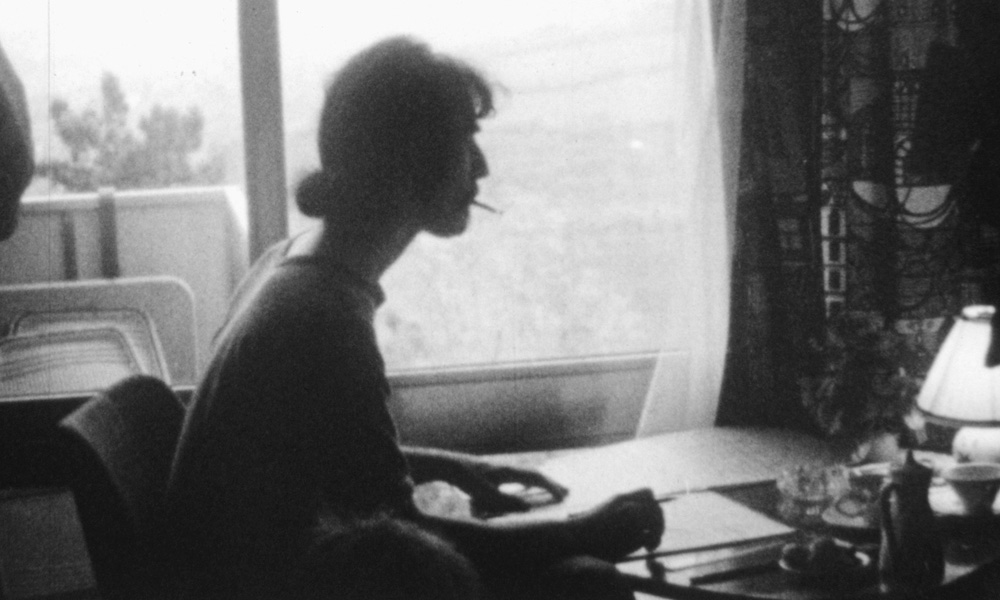
But at the end of the day, we got more out of the Norman Gunston interview with Frank, including a musical number that went from start to end!
Learning Ancient Greek – in Belfast and Adelaide

In pre-Covid days I idly browsed the magnificent sites for ancient language holiday courses at ivy-dressed, stone-built universities intending – one day – to enrol in a fortnight of glamorous intellectual slavery at Cornell or Oxford. I would work as hard as Dicaeopolis, slaving over my participles into the night, my Liddell and Scott illuminated by candles for some reason. I’d return to my usual term-time classes at the WEA in February, all shiny and brilliant from my overseas deep dive. One day…one day…And then of course, someone ate a bat. So overseas or even interstate intensives (there are some excellent intensives held at Australian Universities, in cities which are sadly not as romantic as New York or London) are not in my future for a while.
So, during the 2020-2021 break, as I pined for a return to my face-to-face Greek classes after a year on Zoom, I was intrigued to find a Facebook post from Helen McVeigh, Classical Greek tutor at Queen’s University, Belfast, (helenmcveigh.co.uk) offering Zoom day-long intensives in Greek and Latin at various levels. I learned from Ms. McVeigh’s video that I could understand Greek via an Irish accent filtered by an Australian ear. I emailed Ms. McVeigh, who was charming and encouraging. So I paid the £35 ($AU63 – bargain!) for the Lower Intermediate Greek refresher day and awaited instructions. Ms. McVeigh sent materials. The course would cover third declension nouns, first and second aorists, present participles and the middle voice.
There was just one problem. The class went from 10am to 3.30pm, Belfast time, meaning that I, in the Australian Central Daylight Time zone, would Zoom-in at 8.30 pm Saturday night and Zoom-out at 2 am Sunday morning. I would take my, ‘lunch break’ at 10.45 pm. So I poured some cold white wine after a 40 degree (Celsius) day (which amused my fellow students on their snowy morning) and logged-in. Our tutor Helen was in Belfast; my fellow students were Barbara in Shropshire, Elizabeth in East Lothian, Richard in Wiltshire, Theo in Liverpool and Anne and Diane, both in the West Midlands.
I was interested to hear the difference in accent. I found it difficult to distinguish between the UK α and η. I think I heard π pronounced as ‘pi ‘(imagine!). We worked through exercises and translations together on line and during the breaks. At the request of one student, we diverged from the schedule to deal with αυτος, αυτη and αυτον. It was useful revision and I think that I finally understand the difference between the use of the attributive and predicate positions.
Although I do not pretend to have the concepts which we covered under complete control, and while it is never wasteful to review familiar concepts, I do think that I could have undertaken the upper intermediate class and I hope to have the chance to do so later this year. Helen is a talented and engaging teacher. Recommended for those times when there are no flights to ancient cities.
Also highly recommended; Ancient Greek at the WEA in Adelaide. We return to our face-to-face classes this month. Hopefully. Please join us if you live in Adelaide and have a basic knowledge of Ancient Greek. This year we will review the more difficult grammar and translate original texts. Our teacher Dr. Alessandro Boria is fabulous. The class is friendly – challenging but never frightening. 5.30 on Wednesdays, Angas Street.
***********************************************************************************************************************************
Ancient Greek reading group: for those who have completed the study of the two volumes of Athenaze and for all those with an understanding of the Classical Greek. Tutor will supply material initially, a textbook will be discussed during the course.
A Beautiful Day in the Neighborhood

(Directed by Marielle Heller) (2019)
The Varnished Culture settled down with a choice wine to watch this, fully expecting to enjoy the contents of the bottle more than the film. Spared the viewing of Mr. Rogers’ Neighborhood (1968-2001) due to the tyranny of distance, we guessed this would be an uplifting panegyric of the famous kiddy presenter. Hence we feared a saccharine overdose as with The Sound of Music, more so when we perceived that the story, based on an article in Esquire, would centre around the the cynical, angry, world-weary, troubled, investigative journalist ‘Lloyd Vogel’ (Matthew Rhys), sent (querulously) to do a puff piece on the Play School good-guy, Fred Rogers (Tom Hanks) whose quiet integrity would redeem and bring the common touch of humanity and grace to the hard-bitten.
We have to report, however, that director Heller (though she looks alarmingly like President Biden’s press secretary), has done a remarkable thing with this production. Made with a number of surreal touches, based around the TV show’s set with all its fantasy elements, we were drawn-in to an otherwise predictable yarn. Heller gives us more pauses than a Pinter play; she feels little pressure to gas up the action, but she doesn’t allow torpor to lead to ennui. How she manages to meld a light touch with a sincere depth for feeling, we are not quite sure: certainly there is a lot of love for Rogers that shines through, and the cast are uniformly excellent. In particular, we liked Susan Kelechi Watson in a fairly thankless supporting role as Vogel’s wife, Maryann Plunkett as Mrs. Rogers, and a nice performance by Chris Cooper as Vogel’s estranged, damaged, deadbeat father. Cooper is a great natural actor, and his scenes are valuable here as a fulcrum and for grounding.

The revelation is Hanks in the (co-starring) role of Mr. Rogers. Hanks is not a great natural actor, and many of his roles succeed because he has a winning personality. But here Hanks does get inside the character and makes you believe in him, as he obviously does. It is a lovely bit of playing, spurning the artistic nightmare of an on-screen saint and instead catching the crackle and fizz of a good man of flesh and blood, tranquil belief, sensibility, flaws, and wisdom. We’d never go on a trip with Hanks (e.g. in a spacecraft, on a domestic flight, in a light FedEx plane, or on a container vessel) but we’d be happy to be his neighbour (down here, we spell it with a ‘u’).
/cdn.vox-cdn.com/uploads/chorus_image/image/65210066/rogers3.0.jpg)
Burn After Reading

(2008) (Coen Bros.)
This paean to American stupidity has been likened by The New Republic to the Trump administration. Actually, whilst The New Republic knows a lot about stupidity, it is probably more apt to wield the point in a bi-partisan manner, as the early hallmarks of Trump’s successor seem to trump Mr. Trump and his ilk. Whilst this film has some funnily absurd moments (Brad Pitt’s turn as a complete dope is hilarious, as is Frances McDormand’s outrage at having her attempts to betray her country rebuffed) it is more or less a slapdash affair in low misanthropy.
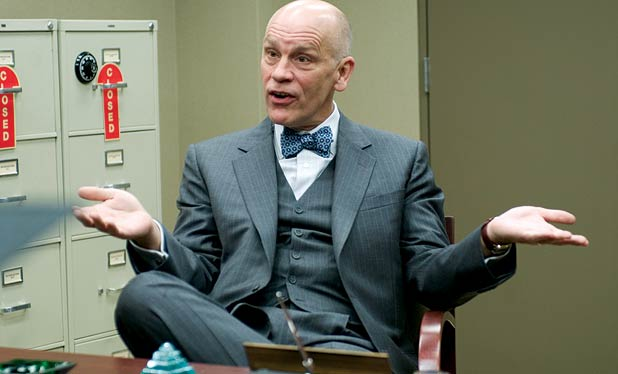
The plot, such as it is, involves the misplacing, then theft, of the draft memoirs of disgruntled CIA analyst (a phoned-in performance from John Malkovich, who nevertheless is invariably worth watching). His wife, a typically overwound Tilda Swinton, is dallying with feckless U.S. Marshall (George Clooney), who has numerous affairs to make up for lack of time to do his cherished 5-mile runs. (Everyone is having affairs). Gym workers Chad (Pitt) and Linda (McDormand) try to blackmail Malkovich to raise money for Linda’s series of plastic surgeries, leading to much blood, sweat and tears. Everyone is greedy, grubby and self-obsessed. All break the law and damage others with impunity. The project rattles its way, unevenly, to a cop-out conclusion. It takes a comic genius to make a funny film with these characters: the Coen Brothers do not qualify. Time to close that file: burn after watching.

You can’t underestimate him: Brad as “Chad”
Black Angel
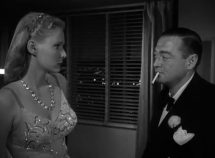
(Directed by Roy William Neill)(1946)
This obscure Universal film noir is rather odd in an intriguing, almost surreal way. A blackmailer, Mavis Marlowe (Constance Dowling), ex-wife of part-time pianist/composer and full-time drunk, Martin Blair (Dan Duryea), turns up strangled in her apartment, one of Blair’s songs reverberating on the record player. Blair was on the spot earlier but the Doorman, under instructions, told him to go jump, whereupon he went on a bender of epic proportions. Meanwhile, Kirk Bennett, a poor sap who’s been having an affair with Mavis, visits, but finds her dead and busily incriminates himself by leaving dabs all about and being seen while scarpering down the stairs. He is duly charged by low-key, low energy detective, Captain Flood (Broderick Crawford), tried, convicted, and sent off to the Big Chair.
Enter Mrs. Catherine Bennett (June Vincent). She is sure Kirk is innocent, and sets about trying to obtain some exculpatory evidence. Finding unlikely help from newly widowed Blair, the two conclude that another man visited Mavis on the fateful night: shady nightclub owner Mr. Marko (Peter Lorre). Blair recalls seeing him take the elevator while the doorman was showing Blair the door, and after all, it is Peter Lorre, the whispering menace. Tolerating Blair’s piano-playing and seduced by Catherine’s alleged torch-song talent, Marko hires them, conveniently allowing them to loiter between sets, hoping to gain access to Marko’s private office and safe. This they do, but complications arise: Blair’s declaration of love for Catherine is slapped away; she goes to see Kirk before he takes the juice; Blair hits the bars, and Peter goes sadly back to the Rio Club to smoke another hundred cigarettes and listen to Shostakovich records.
“Why do you drink?” “To forget.” “Forget what?” “I forget.”
Eventually, all is revealed; the denouement is rather unusual. The film is clearly a ‘B’, Duryea and Lorre the only big names in the cast (Broderick Crawford would not be a leading man until All the King’s Men 3 years later). Duryea’s performance is patchy but he does rather well as the drunk who tends to fall head-over-heels at the drop of his hat (let’s not talk about his piano “playing” however); June Vincent, inexperienced and uncertain, tries her best, sings some silly tunes better than Claire Trevor, and is likeable enough in a role more apt for, say, Gene Tierney or Lauren Bacall. In The Lost One, she recalls that Lorre helped her a lot with tricky scenes, giving a lie to an oft-made suggestion that he phoned-in his lesser roles. He might not be at his peak here, but Lorre infuses Black Angel with style and real menace. He’s too good for the film, but his sad eyes and insinuating manner has – as usual – the viewer on the edge of the seat.
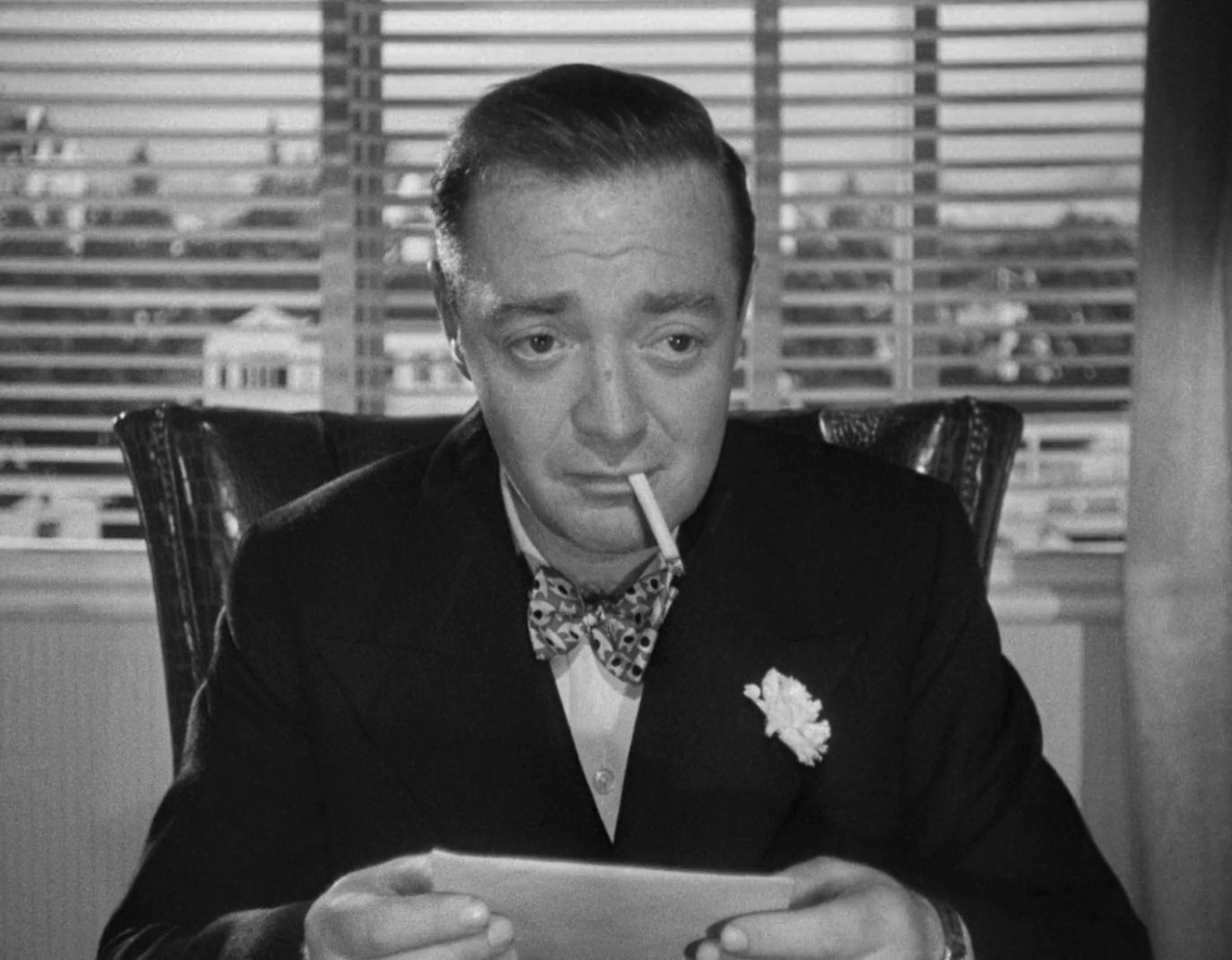
“So it goes…another shady little character…”
David Shipman wrote in “The Great Movie Stars” that Lorre on screen “was a man resigned to the follies of others, clasping to himself his own fastidiousness like a fetish.” He left a giant mark on film and became a symbol that endures in the pallid homages and appropriations which Hollywood re-vamp in the ever-lasting present, as film steadily degenerates into a fading and failing art form.

“Hands off the piano.”
Cat’s Cradle

By Kurt Vonnegut (1963)
Something of a succès d’estime in reverse, this book won admiration for its bleak humour, deadpan reportage and sci-fi elements, until the rot set in and everyone realised that it wasn’t hugely good, with its glib, jerky, episodic micro-chapters, cardboard characters and terrible snatches of verse. Vonnegut was not yet really a novelist; Cat’s Cradle is not really a novel. But here Kurt is an accumulator of ‘bits,’ an amasser of literary bitcoin, and some of his stock is quite brilliant. His false religion, Bokononism, owes something to Spinoza, but with typical jokey authorial touches – the doctrine infused with foma (harmless untruths), the teams of unrelated and oblivious persons somehow related (a karass), and the fulcrum of a karass, a wampeter. Unlike Spinoza, Vonnegut’s humourously desolate theology (with built-in “more zest, more tang“) is deeply nihilistic, which is why, whilst often top drawer, the comedy carries something of an antiseptic sting.
These are pleasant diversions, as is the thin but rich account of eccentric scientists and their indifference to logical outcomes of their research, but the binding triumph of this satiric novella – the brilliant bit – is Vonnegut’s absent-minded professor, Felix Hoenikker (he plays ‘Cat’s Cradle’ with a piece of string while the bomb he developed is dropping on Hiroshima) and his other invention, Ice-nine. Ice-nine is an alternative structure of water that is solid at room temperature and acts as a seed crystal upon contact with ordinary liquid water, causing that liquid water to instantly transform into more Ice-nine, and so on, and compounding, until all the water in a closed system is transformed and the world ends. Such a plaything was given casually by Hoenikker “to such short-sighted children as almost all men and women are…” Written in the shadow of the Cuban Missile Crisis, part of the cold-war nuclear games of chicken with its doctrine of Mutually Assured Destruction, Ice-nine beautifully symbolizes the book’s skepticism about science-sans-morality, the turning of technology towards evil ends, and laughing nihilism.
We won’t describe the shenanigans that take the narrator – ostensibly researching the life of the Professor – to the Caribbean island of San Lorenzo, inhabited by various professorial issue and headed by a Papa Doc figure who keeps his peasants in line with a corrupted version of Bokononism and threat of being hung from a Hook – and also where we confront Ice-nine, the stuff of which nightmares are made (Don’t gingerly test it with the tip of your tongue). Ice-nine’s ability to replicate and extend renders it as pervasive as the 2 most common elements in the universe, hydrogen and stupidity.
Instead of a synopsis, let’s salt, or sweeten our summary of Cat’s Cradle with some nice extracts:
“She believed that God liked people in sailboats much better than He liked people in motor boats.”
“When it [the rain] fell, it would freeze into hard hobnails of ice-nine – and that would be the end of the world! And the end of the interview, too! Good-bye!”
“There was a sign hung around my dead cat’s neck. It said, Miaow.”
“‘Americans’, he said, quoting his wife’s letter to the Times, ”are forever searching for love in forms it never takes, in places it can never be.””
“Never index your own book.”
“Crosby was in his cups and had the drunkard’s illusion that he could speak frankly, provided he spoke affectionately.”
“When Johnson and McCabe came upon the city, it was built of twigs, tin, crates, and mud – rested on the catacombs of a trillion happy scavengers, catacombs in a sour mash of slop, feculence, and slime.”
“It posed the question posed by all such stone piles: how had puny men moved stones so big? And, like all such stone piles, it answered the question itself. Dumb terror had moved those stones so big.”
“The Fourteenth Book of Bokonon is entitled, ‘What Can a Thoughtful Man Hope for Mankind on Earth, Given the Experience of the Past Million Years?’ It doesn’t take long to read The Fourteenth Book. It consists of one word and a period. This is it: ‘Nothing.'”
“Science is magic that works.”




